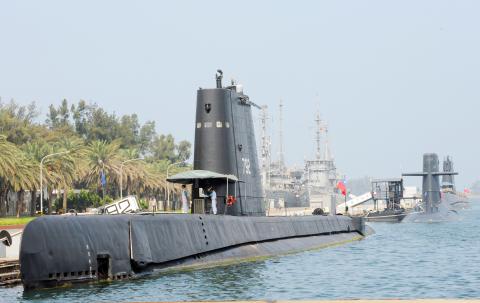The Ministry of National Defense yesterday unveiled a 15-year plan to modernize the Republic of China (ROC) Navy, focusing on domestic shipbuilding with a budget of about NT$200 billion (US$6.2 billion), while a research committee is to assess a program to develop a submarine fleet.
Minister of National Defense Feng Shih-kuan (馮世寬) presented the plan alongside top navy officials ,which he said would provide the needed warships and weapons to defend the nation and its maritime territories in a conflict situation and would also spur growth and elevate the nation’s technological capacity in defense.
A NT$196 billion budget has been allocated for the domestic shipbuilding program, which is to go toward the construction of 138 warships, missile cruisers, fast-attack boats and other vessels, according to a report submitted by Feng at a meeting of the legislature’s Foreign Affairs and National Defense Committee.

Photo: Chang Chung-i, Taipei Times
According to the report, most of the construction of the 138 vessels has been completed, with many undergoing sea trials and testing of their operations and weaponry systems.
The vessels were contracted to China Shipbuilding Corp (CSBC), Jong Shyn Shipbuilding and Ching Fu Shipbuilding, all based at Kaohsiung Port, along with Lung Teh Shipbuilding, which has its shipyard in Yilan County.
Another NT$60 billion has been allocated to start construction next year of unspecified numbers of amphibious transport vessels, mine-layer boats, mine-hunting ships and Tuo Jiang-class guided missile corvettes, Feng said.
The ministry is also to commission the state-enterprise Ship and Ocean Industries Research and Development Center to undertake research and feasibility studies on developing a national submarine manufacturing program, with a budget of NT$30 million.
Naval officials said that diesel engines and electrical supply systems for submarines would need to be procured from overseas.
Feng also told lawmakers that the military would make every effort to bolster personnel training and improve military discipline.
Feng, said that he has given a directive that the military review its personnel training procedures within 45 days and work to improve them.
Chief of General Staff general Yen De-fa (嚴德發) is to then inspect each military unit, he added.
Additional Reporting by CNA

INVESTIGATION: The case is the latest instance of a DPP figure being implicated in an espionage network accused of allegedly leaking information to Chinese intelligence Democratic Progressive Party (DPP) member Ho Jen-chieh (何仁傑) was detained and held incommunicado yesterday on suspicion of spying for China during his tenure as assistant to then-minister of foreign affairs Joseph Wu (吳釗燮). The Taipei District Prosecutors’ Office said Ho was implicated during its investigation into alleged spying activities by former Presidential Office consultant Wu Shang-yu (吳尚雨). Prosecutors said there is reason to believe Ho breached the National Security Act (國家安全法) by leaking classified Ministry of Foreign Affairs information to Chinese intelligence. Following interrogation, prosecutors petitioned the Taipei District Court to detain Ho, citing concerns over potential collusion or tampering of evidence. The

‘FORM OF PROTEST’: The German Institute Taipei said it was ‘shocked’ to see Nazi symbolism used in connection with political aims as it condemned the incident Sung Chien-liang (宋建樑), who led efforts to recall Democratic Progressive Party (DPP) Legislator Lee Kun-cheng (李坤城), was released on bail of NT$80,000 yesterday amid an outcry over a Nazi armband he wore to questioning the night before. Sung arrived at the New Taipei City District Prosecutors’ Office for questioning in a recall petition forgery case on Tuesday night wearing a red armband bearing a swastika, carrying a copy of Adolf Hitler’s Mein Kampf and giving a Nazi salute. Sung left the building at 1:15am without the armband and apparently covering the book with a coat. This is a serious international scandal and Chinese

Seventy percent of middle and elementary schools now conduct English classes entirely in English, the Ministry of Education said, as it encourages schools nationwide to adopt this practice Minister of Education (MOE) Cheng Ying-yao (鄭英耀) is scheduled to present a report on the government’s bilingual education policy to the Legislative Yuan’s Education and Culture Committee today. The report would outline strategies aimed at expanding access to education, reducing regional disparities and improving talent cultivation. Implementation of bilingual education policies has varied across local governments, occasionally drawing public criticism. For example, some schools have required teachers of non-English subjects to pass English proficiency

TRADE: The premier pledged safeguards on ‘Made in Taiwan’ labeling, anti-dumping measures and stricter export controls to strengthen its position in trade talks Products labeled “made in Taiwan” must be genuinely made in Taiwan, Premier Cho Jung-tai (卓榮泰) said yesterday, vowing to enforce strict safeguards against “origin laundering” and initiate anti-dumping investigations to prevent China dumping its products in Taiwan. Cho made the remarks in a discussion session with representatives from industries in Kaohsiung. In response to the US government’s recent announcement of “reciprocal” tariffs on its trading partners, President William Lai (賴清德) and Cho last week began a series of consultations with industry leaders nationwide to gather feedback and address concerns. Taiwanese and US officials held a videoconference on Friday evening to discuss the